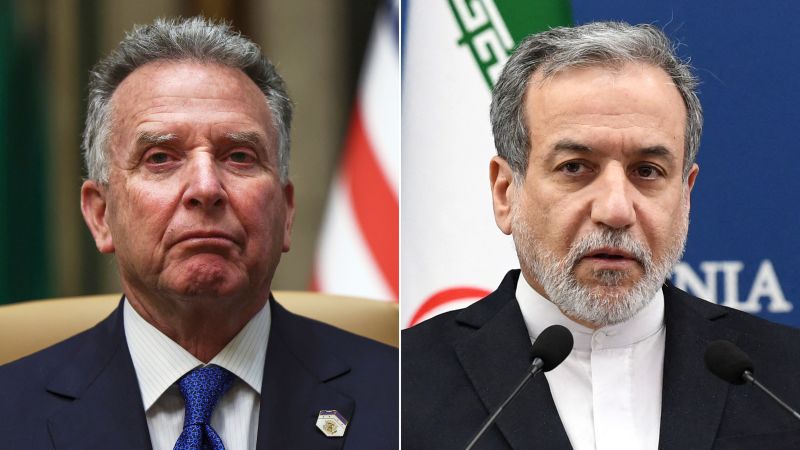CNN
—
A second round of high-level talks between US and Iranian delegations on Tehran’s nuclear program began in Rome on Saturday, amid tempered optimism about a diplomatic way forward.
Saturday’s negotiations come a week after an initial round was held in Muscat. Although the talks are in Italy, Oman is again as mediator between the US team, led by Special Envoy Steve Witkoff, and the Iranian one, led by Foreign Minister Abbas Araghchi.
Arriving in Rome for the meeting, Araghchi told reporters that Iran was committed to diplomacy with the US and said the opportunity for understanding must be taken.
It is a high-stakes engagement, and one that has been preceded by a flurry of diplomatic activity as allies and adversaries alike seek to both understand and potentially influence the aims of the talks.
President Donald Trump on Thursday suggested he is not eyeing imminent military strikes against Iran’s nuclear facilities, but the threat still looms.
“I’m not in a rush to do it because I think that Iran has a chance to have a great country and to live happily without death,” he said when asked about a New York Times report that he had waved Israel off such military action.
“I’d like to see that, that’s my first option. If there’s a second option, I think it would be very bad for Iran,” the US president added.
Ahead of the talks in Rome, Witkoff quietly met on Friday in Paris with Israel’s minister for strategic affairs and Prime Minister Benjamin Netanyahu’s closest confidant Ron Dermer and Mossad director David Barnea.
The Israeli government favors aggressive action against, not diplomacy with, Iran. Netanyahu’s office on Thursday argued Israeli “overt and covert operations” were the reason that “Iran does not currently possess a nuclear arsenal.”
US intelligence agencies warned that Israel will likely attempt to attack Iran’s nuclear facilities, CNN reported in February.
Witkoff was in the French capital with Secretary of State Marco Rubio for discussions on Ukraine, and the two discussed the upcoming Iran meeting with the so-called “E3” allies – France, Germany and the United Kingdom.
“For the Europeans, they have an important decision to make very soon on snapback – on the snapback of sanctions – because Iran is clearly out of compliance with the current deal,” Rubio said on Friday. “That’s going to be a factor in all this and that’s why it was important we talk to them about it before our talks on Saturday.”
“We’re hoping that talks continue and that they’re fruitful and that they’re – that they can lead to something,” the top US diplomat said. “We would all prefer a peaceful resolution and a lasting one.”
Araghchi visited Moscow before heading to Rome, meeting with both Russian President Vladimir Putin and Russian Foreign Minister Sergey Lavrov.
“We are hopeful, and we expect Russia to continue its supportive role in any new agreement,” Araghchi said in Moscow, according to the Associated Press.
The head of the UN’s nuclear watchdog, Rafael Grossi, said during a visit to Iran that the talks are “in a very crucial” stage, adding, “we know we don’t have much time.”
Since the withdrawal of the US from the Iran nuclear deal during Trump’s first term, Tehran has far exceeded limits on uranium enrichment, but has maintained it is not seeking a nuclear weapon.
Saudi Defense Minister Prince Khalid bin Salman Al Saud also traveled to Tehran this week in one of the highest-level trips by a Saudi official in decades.
It was a visit to improve diplomatic ties between Saudi Arabia and Iran and meant to signal that the Kingdom can play a role in de-escalation and brokering peace efforts, a source told CNN.
This source noted that the Saudis do not know what Trump plans in the talks with Iran, and that the assessment in Saudi Arabia is that they may be unpredictable and could be short-lived.
CNN’s Nic Robertson and Kareem El Damanhoury contributed to this report.

